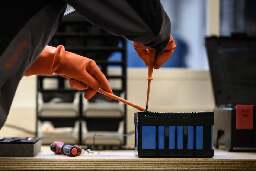EV Batteries Are Dangerous to Repair. Here’s Why Mechanics Are Doing So Anyway



scientificamerican.com
Fixing car and e-bike batteries saves money and resources, but challenges are holding back the industry
You are viewing a single comment



Fixing car and e-bike batteries saves money and resources, but challenges are holding back the industry
You should see what happens to actual mpg in the rain vs in the dry. Its almost like MPG can vary wildly dependent on environment and situation
Yeah the whole range issue is dumb to me. You can recharge it so what's the issue? I recharge mine on long trips and stop to eat at the same time. Who are all these people that want to sit in a car for over 400 miles without stopping? That sounds worse lol I always stopped with my case car to eat or pee anyways. If I stay 30 min to an hour I can get fully charged too.
Also the benefits of never needing to stop to charge or fuel when I'm just driving around town. I can go all over and not need to charge my car for a few days. Then I do it when I sleep.
Also single pedal driving was new to me and I love that! It is so much more responsive if I want to stop I just stop going lol I love it. It has crazy torque too and makes a fun spaceship sound when I drive around.
You misunderstand me. I'm saying that unlike ice vehicles that will continue to get about the same mpg for the life of the vehicle, lithium batteries degrade with every charge/discharge cycle. When an electric is new and you buy one with enough range to suit your needs, every year you own it the max range on a full charge is reduced. So an ev with 120,000 miles on it that started off being able to go 300 miles max will now only go about 250 miles max. The batteries lose capacity. The federally required 8 year 100k mile warranty on batteries only covers if the capacity of the battery is less than 70% of the original capacity. Typically though, evs are usually in the range of 80 to 90% capacity at the 100k point. They don't start dropping off hard until they're closer to around 200k and over 10 years old most of the time. Total failure due to dead shorts in too many cells has been happening around the 14 to 18 year area. That's when you decide to sell it for $3,000 or pay $15,000 to install another battery.
If I get to 14 to 18 years on a car without every having to replace an engine, transmission, it never gets in a crash that writes it off entirely, and its still worth $3k at the end I consider that a win.
My old Volvo is 43 years old and has never had engine or transmission changed. It’s gone for 350,000 km and is still going strong. Is probably worth somewhere in the region of $2k. I don’t see any of the cars made today managing the same feat.
That's straight up survivorship bias
Here's the summary for the wikipedia article you mentioned in your comment:
^article^ ^|^ ^about^